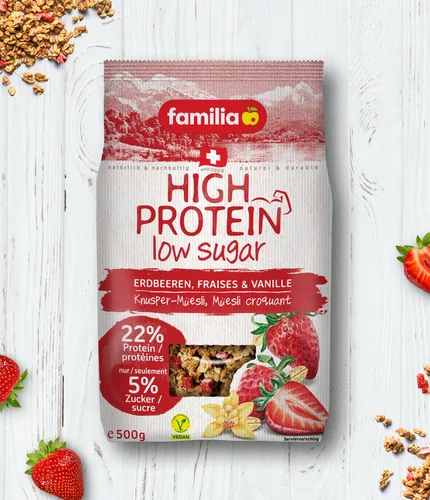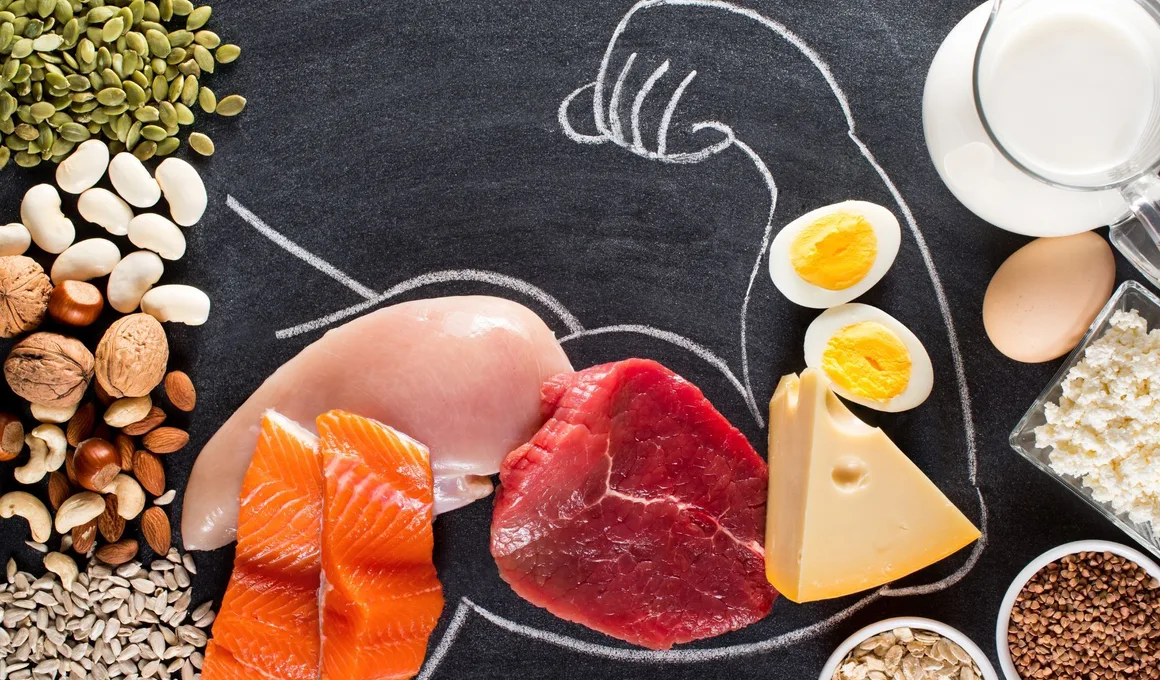
familia High Protein low sugar Strawberries & Vanilla Single bag à 500 g

What’s the best way to avoid becoming overweight? To start with, we need to understand how being overweight develops. In the following sections, we’ve provided a brief, evidence-based insight into scientific models that explain how people become overweight – and how this can be avoided.
We’ll look at three questions:
Insulin is a hormone made by our bodies that fulfils various functions, i.e. it is released in greater quantities by our pancreas as soon as our blood sugar level (or more accurately, our blood glucose level) rises. Insulin removes glucose from the blood and enables it to be absorbed by our body’s cells. In simple terms, the hormone keeps blood sugar levels in check and gives cells energy in the form of glucose.
One explanation behind why people become overweight is the carbohydrate-insulin model (CIM), which runs counter to the ‘traditional’ energy balance model. This model says that the only thing that matters, if someone is overweight, is the amount of calories consumed. This approach has obvious weaknesses. CIM, conversely, says that it’s not about the calories per se, but the type of calories. It links a diet high in refined – and by extension, quickly digestible – carbohydrates with being overweight. Put simply, this involves the following mechanism taking place in the body: if we eat lots of quickly digestible carbohydrates multiple times a day, we will have a chronically high blood insulin level because the insulin needs to reduce the high blood sugar level (or actually, the glucose level). Some of the glucose is stored in the liver and muscle as a carbohydrate reserve. As these stores are limited, excess glucose is converted into fat. Normally, full fat cells send a signal to the brain that there’s enough energy available, which, in turn, leads to you feeling full. However, insulin blocks this signal, i.e. we keep feeling hungry – and we continue to eat more. This is exacerbated by the fact that sugar triggers our reward centre. Instead of using up our fat reserves, they’re topped up even more. It’s a vicious circle.

Now, what about protein? How does this impact being overweight? After extensive research, two biologists David Raubenheimer and Stephen Simpson performed a study in 2003 that explored a hypothesis relating to the role of protein. They called their work ‘The Power of Protein’.
In this study, participants were able to eat from various rich buffets until they felt full, over a period of several days. The buffets differed in terms of the proportion of the macronutrients (protein, carbohydrate and fat) they contained. One buffet had foods full of protein but low in carbohydrates and fat, while the other had lots of low-protein, high-carbohydrate, high-fat foods. They noticed that participants ate much more when the buffet had lots of low-protein, high-carbohydrate and high-fat foods than when the buffet was primarily composed of protein-rich foods. This led to the hypothesis that protein governs macronutrient consumption – a theory that has since been confirmed multiple times and is now referred to as ‘protein leverage’. In simple terms, we eat until we’ve consumed our target amount of protein. Only then are we satisfied. As a result, we automatically ingest less energy when we eat food with a higher protein content – reducing the risk of becoming overweight.
As a result, the carbohydrate-insulin model and the protein leverage hypothesis don’t contradict each other: they’re two sides of the same coin.

You’d be wrong to think ‘the more protein, the better’, though. Rather, it's about getting the ideal quantity and quality of protein in our diet. The reference values for our daily intake are currently 0.8 grams of protein per kilo of body weight. Taking into account modern research, though, the optimum quantity is actually 1.2 to 1.6 grams of protein per kilo, per day. Just two small 50-gram portions of our High Protein Low Sugar Strawberry Vanilla Crunchy Müesli provide a third of the ideal daily protein intake for a person weighing 60 to 70 kg.
